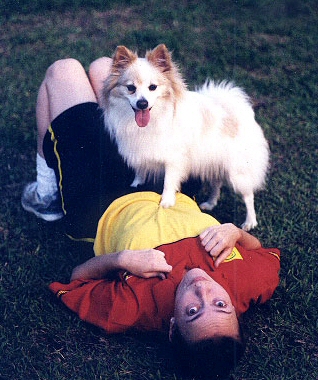El Agility in Colombia
|
|
|
|
Where politics, social and security problems don't stop agility
|
|
Agility only started up in Colombia in 1998 in the two principal cities Bogotá and Medellín. It is regulated by the ACCC (Asociación Club Canino Colombiano) which internationally is within the Federation Cynologique Internationale (FCI), but at the same time we permit the participation of non-registered dogs as we need to have more dogs in trials. The first agility trials that were organised in Colombia were always under the framework of Breed Shows carried out by the ACCC, which is how Agility became an official sport and FCI affiliated. However, some go-ahead businesses such as pet food makers Purina and Solla collaborated to help us hold more official trials and gave some assistance to the first training clubs. In the beginning getting training resources was complicated; we practised with broomsticks, bed railings, and any object that we could recycle from the trash. It was all very improvised, but we were very motivated by our love for our dogs and our determination to train them.
In Medellín there are five clubs: Club Sociedad Canina, Gama, Cadecán, Handler and C.A.C. Oriente Antioqueño. All have very competitive dogs some of which have already participated in the World FCI Championships in France and Italy. International
competition Colombia only practises agility under FCI regulations, a situation that obliges us to have registered dogs to be able to aspire to participate in the world championships. But we are hoping to practise agility at USDAA or AKC trials in the USA and in this way we hope to be able to participate in international events with dogs that are not registered or that are crossbreeds, as they do in Mexico, Puerto Rico and Japan among others. Agility is
fun in Columbia, too Agility handlers in Colombia are learning more about the sport every day, and our goal is to apply the better training techniques without violence or abuse. The experience we have gained in international trials has encouraged us to improve and to breed a new generation of Border Collies, Shelties and Fox terriers, among other breeds, which are still in the young phase but are our hope and dream for the future. Politics and
agility don't mix
For more information about agility
in Columbia, South America visit
|
El Club Sociedad Canina |
 About
the author...
About
the author...
Carolina Mejia started agility in 2001 with a small Spitz small named Penelope who is now four
years old. Today she also has a pedigree Sheltie named Yelly (2) Yelly who is now competing in
Grade 1, but is very good!
She is a member of Club Sociedad Canina, under the tutelage of Carlos Quiroz. The club currently has 32 dogs of all different breeds and sizes in training at present to be part of the Columbian Team.
Carolina and Penny has participated in the Americas and Caribbean tournaments in Colombia 2002 and in Peru in 2003, and also in the Grand Prix of Dog Agility in Dallas, Texas (USA) in 2003.
Carolina lives in Medellin.

|
[bottom.htm] © Copyright Agilitynet |